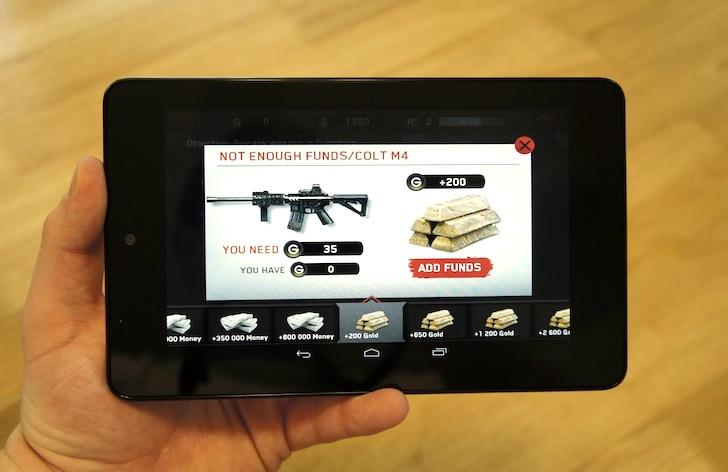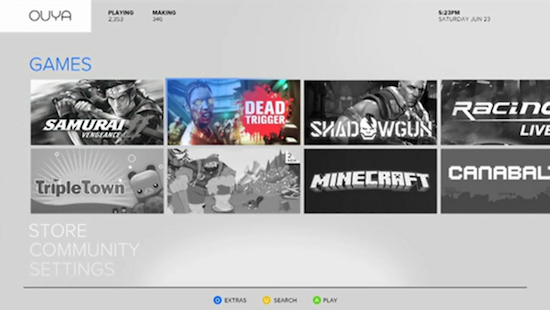
If you compare today's mobile games with those from just two or three years ago, you can see a vast and very clear change in the approach from developers. It's not all about side-scrolling time wasters anymore. With each and every iteration of new hardware come more serious, in-depth games for smartphones and tablets.
Games like Dead Trigger and Shadowgun, both from game development firm MADFINGER Games, utilize the very capable NVIDIA Tegra 3 chipset to create realistic, simulated graphics as opposed to the pre-coded animations that have become customary for mobile games. This gives the game a much more console-like feel. And while games like Real Racing 2 HD by Firemint don't quite stand up to their console racing counterparts, they show that mobile gaming will eventually be capable of – and may someday surpass – console-style gaming.
The capabilities of hardware in some of the market's more powerful devices very nearly compare to the capabilities of modern day consoles. The problem, however, isn't necessarily the hardware itself, though. It's the ergonomics of playing games from a pocket-sized, all-touchscreen device or from an all-touch tablet. Serious gaming on a touchscreen is an oxymoron. And mobile has yet to gain widespread attention from AAA developers, leaving only a few select big titles on mobile.
This morning, however, a Kickstarter campaign that could change mobile gaming forever was started. It's called OUYA (pronounced "Ooo-yah") and its creators plan to upend the console gaming community for $99 a pop. The OUYA Kickstarter project was opened for funding this morning, and at the time of this writing, the project has raised $953,862 of the $950,000 goal. That's nearly $1 million in under 12 hours. It should go without saying that there is some fire behind this one, folks.
So what is OUYA, exactly? It is an Android-powered game console for your HD television. On the inside, it will have a NVIDIA Tegra 3 quad-core processor, 1GB RAM, 8GB built-in storage, HDMI out, Wi-FI 802.11 b/g/n, Bluetooth 4.0, USB 2.0, all powered by Android 4.0. It will also come with one wireless controller (or two, depending on your pledge amount) which features two analog sticks, a directional pad, eight "action" buttons, a system button and a trackpad.
"But what does it do, Taylor? What does it do?" I'm glad you asked. Instead of just being another Android device, this is simply Android-powered (think Kindle Fire). It will have its own marketplace where any developer can publish their applications to OUYA. And since it's running Android, albeit a heavily customized version, developers can easily publish existing games to OUYA with relative ease.
The uprooting concept here is that all OUYA games will strive by the freemium model. Every game available for OUYA will be free-to-play for users for at least some portion of the game. The developers will make their money through in-game purchases, upgrades and add-ons.
And this is an open video game console, a developer's console. The Kickstarter page reads:
"Hackers welcome.
Have at it: It's easy to root (and rooting won't void your warranty). Everything opens with standard screws. Hardware hackers can create their own peripherals, and connect via USB or Bluetooth. You want our hardware design? Let us know. We might just give it to you. Surprise us!"
While the OUYA team wasn't open about which developers or game-making firms are on board with the project, there are some that have openly shown interest. So far, Mojang (developer of Minecraft), Jordan Mechner (creator of Prince of Persia), Adam Saltsman (creator of Canabalt), MADFINGER Games (Dead Trigger, Shadowgun) and several more have been quoted or shown in screen shots on the Kickstarter page. And that makes me truly happy and excited for this project – on day number one, the project already has lots of steam behind it.

It also makes me excited for what this could mean for mobile gaming and, specifically, for Android. OUYA is powered by the little green robot. So if it snags the attention of any AAA developers or even some great indie game developers, there's a good chance we, too, will see them available for our favorite Android handsets.
By no stretch of the term am I a "hardcore gamer". Sure, I've had my own little episodes of being completely obsessed with several games for a while – I put over 70 hours into Skyrim in roughly 10 days, and over the course of a year or so, I logged over 34 days of play time in Call Of Duty 4: Modern Warfare. (Those were the days…) I am easily entertained and generally don't have enough time to work through a long, drawn-out campaign. So mobile games outlet as of late; they're cheaper, easier to pick up and put down and quickly improving.
My one fear, though, is that OUYA could completely ruin gaming as we know it. As our own Evan Selleck, an self-acclaimed gamer, said last week, in-app purchases are ruining mobile games. And, while I can only agree with him to some extent, the exact same could (and likely will) happen to OUYA. (How annoying would or will it be for someone who was willing to pay more than you to have all of the best guns and equipment in an online multiplayer first- or third-person shooter?)
I hope developers – indie and major corporations alike – can take a stand against in-game accelerators while also opening their loving arms to an open, hacker-friendly console like OUYA. And, at the same time, let's hope they also open their hearts to Android itself, not just the $99 box meant for your HDTV.
Image via OUYA Kickstarter